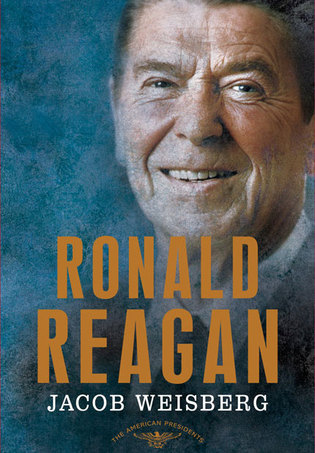
Ronald Reagan
Jacob Weisberg ’86
Times Books, $25
Reviewed by David Greenberg ’90
David Greenberg ’90, associate professor of istory at Rutgers and author of Republic of Spin: An Inside History of the American Presidency, writes occasionally for Slate.
Revered by conservatives, excoriated by liberals, Ronald Reagan remains our most polarizing president. He also has confounded historians: was he, as some charged, a simpleton, detached from even his own administration’s decisions? Or, as revisionists claim, was he a visionary with a robust ideology that he implemented over eight White House years?
In recent years, fresh-minded, nonpartisan scholarship from the likes of John Patrick Diggins and Sean Wilentz has tried to resolve the contradictions. Now, with Jacob Weisberg’s Ronald Reagan, it has borne its finest fruit. A longtime journalist who runs Slate, Weisberg plausibly explains how the warrior against détente could help engineer arms-control deals. He shows how the enemy of government waste could saddle the Treasury with budget deficits. He illustrates how the executive who forgot Cabinet members’ names could edit his speechwriters’ drafts to ensure their place in history books. It’s safe to say that no finer short biography of Reagan exists.
Without pretending to psychoanalysis, Weisberg probes Reagan’s impenetrable mental processes—closing the gap between the ideologue who lucidly foresaw the Soviet Union’s demise and the father who didn’t recognize his son at his graduation. Reagan, Weisberg says, had a tendency to drift into unreality, shielding himself from the ways his actions violated his principles. With an eye for humor, but without stooping to ridicule, Weisberg returns time and again to Reagan’s Möbius-strip self-delusions, as when he insisted about the Iran-Contra affair: “I told the American people that I did not trade arms for hostages. My heart and my best intentions still tell me that’s true, but the facts and the evidence tell me it is not.”
Weisberg digs deepest into Soviet-American relations. He shows that while Reagan never shrank from calling out Communist Russia, he also sincerely wished for a nuclear-free world. His bellicose words thus masked a desire to cooperate—something no one grasped until Gorbachev arrived. Fueled by his native optimism, guided by Secretary of State George Shultz, Reagan rejected hard-liners’ advice to spurn the reformist leader. Within a few years of denouncing “the Evil Empire,” Reagan could thus depart Washington on Air Force One declaring, “The Cold War is over.” Like a speech from the Great Communicator himself, this book makes it all seem comprehensible.
 loading
loading